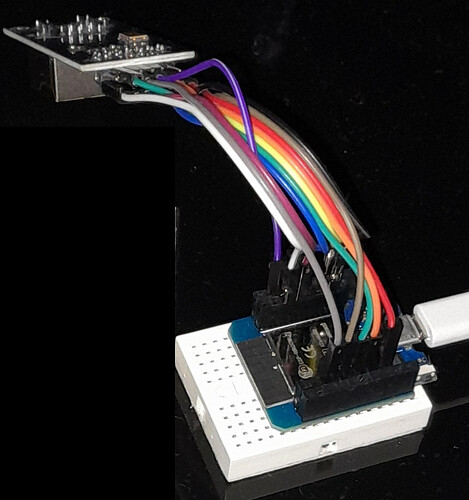Hello everyone
I would like to know if any of you have already used a LAN8720 with an ESP32 devkit v1.
Because I've been trying to make it work for weeks without success.
Do you have a connection diagram, as well as a simple program to make it work?
For your information, here is a program that I used:
/*
This sketch shows how to use lan8720 with esp32 with minimal/standard configuration
You can set the parameter in begin function or at start with define before the import
of ETH.h file, this way is preferible.
by Renzo Mischianti <mischianti.org>
*/
// I²C-address of Ethernet PHY (0 or 1 for LAN8720, 31 for TLK110)
#define ETH_PHY_ADDR 1 // DEFAULT VALUE IS 0 YOU CAN OMIT IT
// Type of the Ethernet PHY (LAN8720 or TLK110)
#define ETH_PHY_TYPE ETH_PHY_LAN8720 // DEFAULT VALUE YOU CAN OMIT IT
// Pin# of the enable signal for the external crystal oscillator (-1 to disable for internal APLL source)
#define ETH_PHY_POWER -1 // DEFAULT VALUE YOU CAN OMIT IT
// Pin# of the I²C clock signal for the Ethernet PHY
#define ETH_PHY_MDC 23 // DEFAULT VALUE YOU CAN OMIT IT
// Pin# of the I²C IO signal for the Ethernet PHY
#define ETH_PHY_MDIO 18 // DEFAULT VALUE YOU CAN OMIT IT
// External clock from crystal oscillator
#define ETH_CLK_MODE ETH_CLOCK_GPIO17_OUT // DEFAULT VALUE YOU CAN OMIT IT
#include <ETH.h>
static bool eth_connected = false;
void WiFiEvent(WiFiEvent_t event) {
Serial.println(event);
switch (event) {
case ARDUINO_EVENT_ETH_START:
Serial.println("ETH Started");
ETH.setHostname("esp32-mischianti-eth");
break;
case ARDUINO_EVENT_ETH_CONNECTED:
Serial.println("ETH Connected");
break;
case ARDUINO_EVENT_ETH_GOT_IP:
Serial.print("ETH MAC: ");
Serial.print(ETH.macAddress());
Serial.print(", IPv4: ");
Serial.print(ETH.localIP());
if (ETH.fullDuplex()) {
Serial.print(", FULL_DUPLEX");
}
Serial.print(", ");
Serial.print(ETH.linkSpeed());
Serial.println("Mbps");
eth_connected = true;
break;
case ARDUINO_EVENT_ETH_DISCONNECTED:
Serial.println("ETH Disconnected");
eth_connected = false;
break;
case ARDUINO_EVENT_ETH_STOP:
Serial.println("ETH Stopped");
eth_connected = false;
break;
default:
break;
}
}
void testClient(const char *host, uint16_t port) {
Serial.print("\nconnecting to ");
Serial.println(host);
WiFiClient client;
if (!client.connect(host, port)) {
Serial.println("connection failed");
return;
}
client.printf("GET / HTTP/1.1\r\nHost: %s\r\n\r\n", host);
while (client.connected() && !client.available())
;
while (client.available()) {
Serial.write(client.read());
}
Serial.println("closing connection\n");
client.stop();
}
void setup() {
Serial.begin(115200);
WiFi.onEvent(WiFiEvent);
ETH.begin();
}
void loop() {
if (eth_connected) {
testClient("mischianti.org", 80);
}
delay(10000);
}
And my connections :
|GPIO21 | TX_EN|EMAC_TX_EN|
|GPIO19 | TX0|EMAC_TXD0|
|GPIO22 | TX1|EMAC_TXD1|
|GPIO25 | RX0|EMAC_RXD0|
|GPIO26 | RX1|EMAC_RXD1|
|GPIO27 | CRS_DV|EMAC_RX_DRV|
|GPIO17 | EMAC_CLK_180|REFCLK|
|GPIO23 | MDC|Output to PHY|
|GPIO18 | MDIO|Bidirectional|
Thanks in advance

